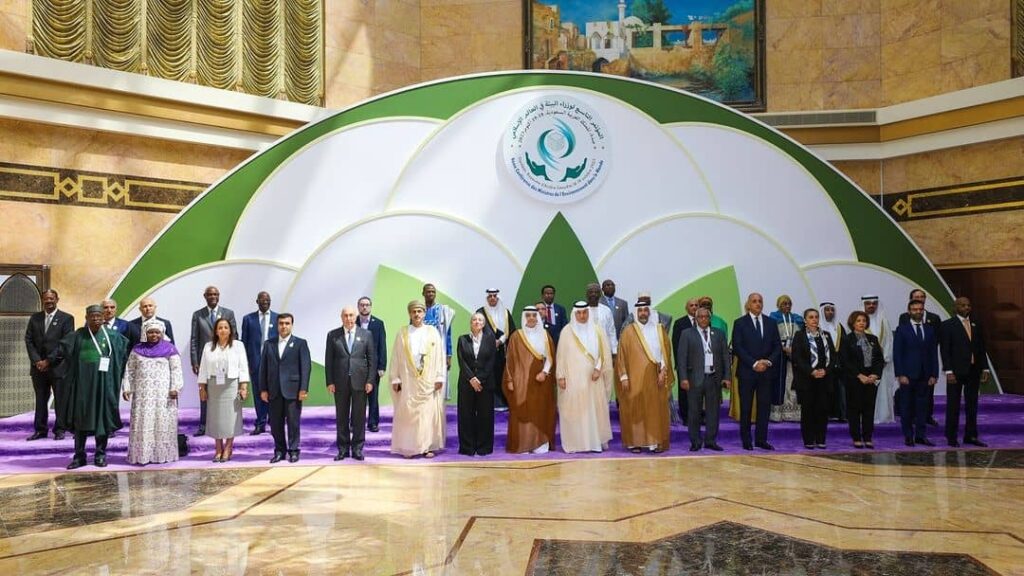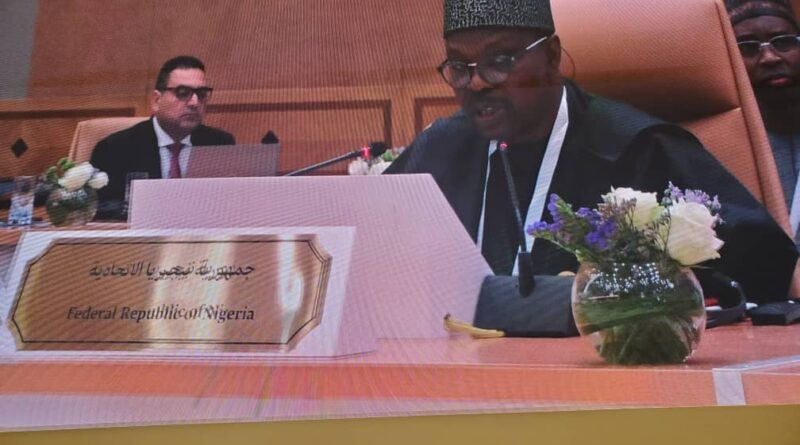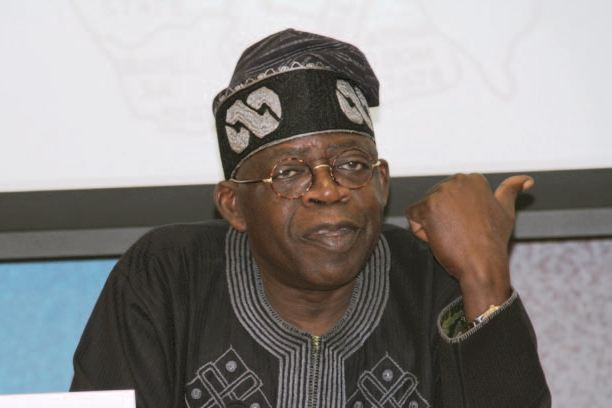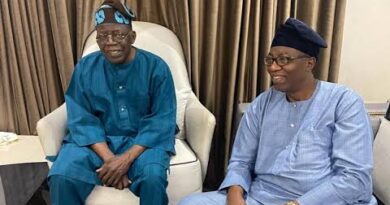Jeddah 2023: Salako Addresses Conference of Environment Ministers in Islamic World
…….. Says Environmental Protection is a Divine duty of all Muslims
Nigeria has continued to make great strides in sustainable environmental governance, reclamation and rehabilitation of degraded land, biodiversity conservation, sustainable waste management, pollution control, mitigating climate change as well as adapting to its impacts. This was stated by Dr. Iziaq Adekunle Salako, the Nigerian Minister of State for Environment at the 9th Conference of Environment Ministers in the Islamic World. The conference, with the theme, “Towards Green Transformation in the Islamic World”, was held on October 19th, 2023 at Jeddah, Kingdom of Saudi Arabia.
Salako said “Nigeria is a land of beautiful diversity. It is diverse in its people, language, culture, education, ecosystems and religions. It is based on the advantage of this diversity that I stand before you in this forum to share progress made towards green transformation.
“As Muslims, we know Allah, the Almighty, has created us to worship Him alone with that, be His vicegerents on this earth. As Allah says in Surah Al Baqarah 2:30 “And mention O Muhammad, when your Lord said to the Angels” Indeed I will make upon the earth a successive authority (vicegerent). They said “Will you place upon it one who causes corruption therein and shed blood, while we declare Your praise and sanctify You?” He, (Allah) said, “Indeed I know that which you don’t know”. These alongside many narrations in Sunnah indicate man’s privileged position on earth and also places the responsibility of the sustainability of planet earth on the shoulder of man”.
He said religion does have an important role to play in the conservation of the environment and in Islamic ethos, adding that environmental protection is a divine duty of all Muslims.

“As Muslims, we are trustees of Almighty Allah on earth with ethical duties of stewardship (Khilafa), responsibility (Amanah), balance (Mizan) and Justice (Adl). Our gathering here is therefore in furtherance of the fulfillment of our roles as stewards/vicegerents of the earth responsible for caring for the environment and mitigating negative consequences of some of our activities.”, Salako noted.
He said the President of the Federal Republic of Nigeria, President Bola Ahmed Tinubu GCFR through his 8-point priority agenda and his “courageous decision in ending fuel subsidy” is demonstrating the centrality of climate action and sustainable environmental management as a panacea to long term development and economic health of Nigeria.
“My country continues to take decisive climate actions and commit to international protocols, treaties and agreements to promote environmental sustainability, climate governance and green transformation. My country is committed to playing its part for the world to achieve green transformation, doing businesses, achieving growth and economic development through sustainable best practices that safeguard our resources.”, he added
The Minister of state gave highlights some of the projects, programmes and initiatives embarked upon by the Nigerian government:
• National Strategy to combat wide life and forest crime (2022-2026); Just before I travelled for this conference, one of the last assignments that I undertook is the supervision of the incineration of about 4 tons of seized wildlife items including pangolin scales, leopard, python and crocodile skins.
In the coming days, we shall be crushing about 2.5 tons of elephant trunk and use the powder to construct a monument as a strong message to wildlife traffickers that Nigeria will protects its rich biodiversity and unique ecosystem.
• Establishment of National Forestry Trust Fund towards to sustainability fund forestry protection, conservation, preservation and development;
• We are investing heavily in tree planting and land rehabilitation through the Great Green Wall initiative and have raised over 44 million of assorted tree seedlings, distributed over 10 million to farmers and rehabilitated over 13,000 hectares of degraded land
• We have endorsement of international treaties or agreement such as the United Nations Framework on Climate Change, Kyoto Protocol, The Glasgow Declaration, Convention on Biological Diversity, Convention on International Trade in Endangered Species (CITES) just to mention a few.
• Enactment of the Climate Change Act 2021 with the subsequent establishment of the National Council on Climate Change to coordinate climate action amongst government agencies and the private sector.
• Nigeria pioneered the issuance of Sovereign Green Bonds in Africa which has been successfully issued twice in 2017 and 2019 and currently in the process of being issued for the 3rd time.
• We have developed and implementing our Energy Transition Plan (ETP) towards achieving Net-zero by 2060. We are on track to end gas flaring by 2030 through initiatives like the 4000km Trans-Sahara Gas Pipeline project.
• Nigeria being an oil producing state faces the environmental challenge of oil pollution. The Hydrocarbon Pollution Remediation Project (HYPREP) has been established to focus on cleaning up a part of the Niger Delta impacted by oils spills. We are also monitoring better and responding faster to oil spills through our oil spill monitoring mechanism.
• Nigeria is actively involved in climate diplomacy across the world. To this end, Nigeria’s participation in almost all UNFCCC Conference of Parties (COPS) have presented opportunities for major directions in National and International climate actions such as COP 26, COP 27 and the upcoming COP 28.
He reiterated that Nigeria, as a responsible member of the global community will continue to contribute her quota towards the achievement of global climate goals and high-level agenda as capture in the Paris agreement. He added that Nigeria will continue to build partnerships and solicit supports that respects the sovereignty and factor-in the uniqueness of the Country.
“Nigeria requires collaboration, mutual accountability and the upscaling of international cooperation to achieve her green transformation goals. I therefore solicit for strong and sustained support, green investments and partnerships from the ICESCO member countries particularly in areas of sharing best practices, capacity building, technology transfer and management, market access and funding. Nigeria, the strongest and biggest economy in Africa is opening her borders for green financing, technology and expertise”, Salako concluded




